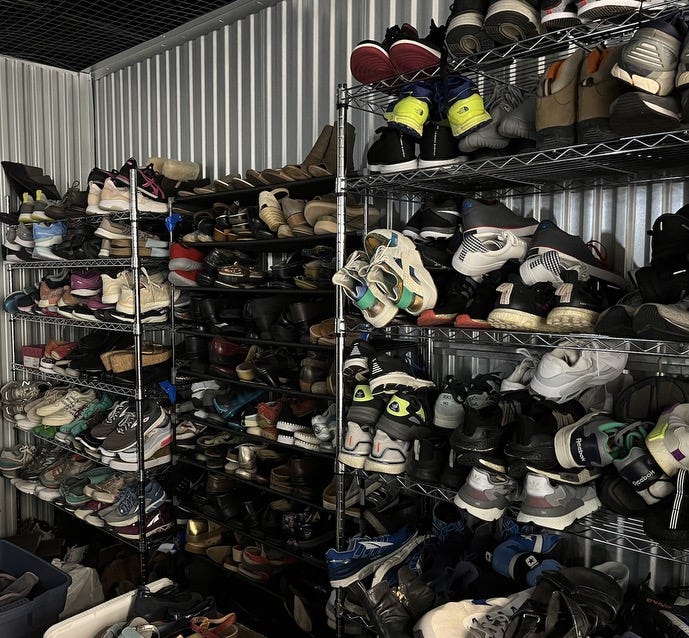OCD: My Entrepreneurial Superpower
My Mental Illness is Now Worth One Quarter of a Million Dollars
About five years ago on Christmas Day, I stood over the kitchen sink in a luxurious hotel in Belize, washing the sand off of some seashells I found on the beach. And while I've always collected shells on our family's beach vacations, this time, I collected 1200 of them in two days. I spent my entire vacation finding them, washing them, drying them, sorting them by size, color, and shape, and yelling at my brother to stop touching them. They were all lined up on paper towels in perfect rows, taking over our suite's entire kitchen counter and dining table. When I had to put my masterfully organized collection into Ziploc bags to bring them home, I became hysterical. I cried so hard that I had trouble breathing, all because my process and hard work were interrupted.
I have Obsessive Compulsive Disorder (OCD), and collecting seashells was one of the many ways my disorder manifested itself when I was younger.
I went from being terrified of red markers (the sight of one would induce a panic attack) to being completely germ-phobic (where I used so much hand sanitizer that I all but wiped out my immune system) to having intrusive thoughts where I pictured every detail of my mom's funeral. The only upside of that was that I now have my eulogy for her memorized for when the time comes.
When people find out about my experience with OCD, they often ask me if I would get rid of it if I could. A few years ago, my answer would have been an unequivocal yes. But now, you couldn't pay me enough to get rid of it. Why? Because I've figured out how to turn something that was meant to drag me down into a powerful and productive force that makes me successful.
My OCD plays a major role in my success as an entrepreneur. About 3.5 years ago, I started a reselling business where I go to thrift stores and yard sales and find undervalued items to flip online for a profit. About half of what I sell is shoes (over 1,000 items currently in my inventory).
When I began selling used shoes (and other items) online, it was a small side hustle. Now, I run a six-figure reselling business out of my 10x18 foot garage, part-time. In the last 3.5 years, I’ve sold over 6k items and had over $250,000 in sales. And that’s all thanks to my OCD.
My obsession with organization has led me to create an inventory system where I can find any pair of shoes within fifteen seconds. Size 7.5 sandals? Third rack, second and third shelf, front right. European size shoes? First rack, top two shelves. Kids shoes? In two bins under the second rack sorted by size and type. Impressive or insane? You decide.
My profit spreadsheet is a work of art (well, to me anyway), where I store data on each of my sales, my cost of goods, my gross and net profit, and where and when each pair sold. I can tell you that my accountant is thrilled by my obsessive bookkeeping. My attention to detail allows me to pack up hundreds of shoes simultaneously without mixing up any mailing labels. My fear of going broke motivates me to be a tough negotiator, budget well, and keep my spending in check.
In a way, I have monetized my mental illness.
With mental illness, it's about leveraging what you can and managing the rest.
I’m not alone in my experience as an entrepreneur with mental illness. New research has found that entrepreneurship is often associated with increased rates of mental health conditions. Half of the entrepreneurs in a recent study had one or more mental health conditions, with a third having two or more. And it’s no coincidence. Many successful entrepreneurs have learned to use their mental illness to their advantage. My mom has run a successful consulting business for 20 years -- and credits her catastrophic thinking for helping her anticipate and plan for challenges and setbacks.
We aren’t successful despite our mental illness. We are successful because of our mental illness.
Do I love having OCD? No. Do I sometimes wish that I had more control over it? Of course. But I don't wish I didn't have it.
If you look online at OCD treatments, you will come across phrases like "how to beat your OCD," "how to combat your OCD," "how to defeat your OCD," and "how to battle your OCD." There are no articles or research about how to "befriend your OCD."
When I was younger and was obsessively googling treatment options for OCD, reading those phrases made me believe that OCD was the enemy.
When I was sorting the shells and could not stop myself, I believed that my OCD was working against me. It stopped me from enjoying a family vacation and it led me to wash the shells so meticulously that my hands were raw. Now those 1200 shells sit in a jar in my room at my parent’s house, collecting dust.
But I can’t get rid of them. They remind me that what used to be my greatest weakness is now something I’ve leveraged to build a shoe empire.
When I look at the shells, one thing becomes clear:
OCD is not the enemy. It’s my superpower.
Sophie Riegel is an author, speaker, coach and mental health advocate. She uses her superpowers to coach parents, graduates and employers on intergenerational communication and wellbeing. She speaks to more than 1,000 students annually about mental health and personal growth. Sophie also trains people on how to successfully use online reselling platforms to make a profit and be more independent.
Specific information about Sophie’s reselling process can be found here. Visit Sophie’s website for coaching and keynote availability.






